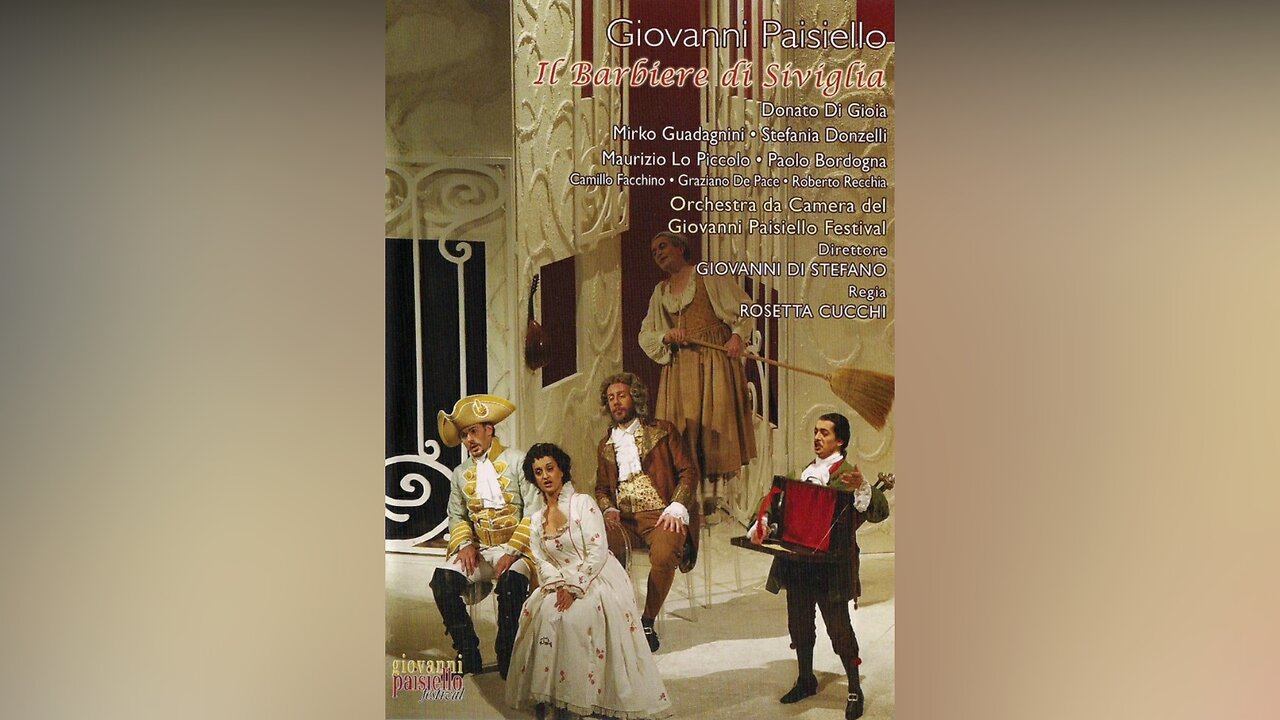Premium Only Content

Paisiello: Il Barbiere di Siviglia | Giovanni Paisiello Festival (Teatro Orfeo 2005-MULTI SUB)
Il barbiere di Siviglia, ovvero La precauzione inutile (The Barber of Seville, or The Useless Precaution)
Composer: Giovanni Paisiello
Librettist: Giuseppe Petrosellini
Premiere: 26 September 1782 (Imperial Court, Saint Petersburg)
Language: Italian
Subtitles: Italian, English (Click on CC)
Cast & Characters:
Conte d'Almaviva - Mirco Guadagnini
Figaro - Donato di Gioia
Rosina - Stefania Donzelli
Don Basilio - Paolo Bordogna
Don Bartolo - Maurizio Lo Piccolo
Un giovinettо/Un Alcade - Camillo Facchino
Lo svegliato/Un notaro - Graziano Da Pace
Marcellina (personaggio aggiunto) - Roberto Recchia
Orchestra da Camera del Giovanni Paisiello Festival
Conductor: Giovanni Di Stefano
Stage Director: Rosetta Cucchi
rec. Teatro Orfeo, Taranto, 2005
The opera was first performed on 26 September [O.S. 15] 1782 at the Imperial Court, Saint Petersburg. It was adapted from the 1775 play Le Barbier de Séville of Pierre Beaumarchais. The full title for the opera reads: Il barbiere di Siviglia, ovvero La Precauzione inutile, dramma giocoso per musica tradotto liberamente dal francese, da rappresentarsi nel Teatro Imperiale del corte, l'anno 1782 (Trans: "The Barber of Seville, or The Useless Precaution, comical drama with music freely translated from the French, presented at the Imperial Court Theater, the year 1782").
The story essentially follows the original Beaumarchais play, and in some places directly translates songs and dialogue. The plots of the Paisiello and the Rossini versions very closely resemble each other, with subtle differences.
Several musical adaptations of Il barbiere di Siviglia predated the version by Paisiello, but Paisiello's comic opera was the first to achieve widespread success. It was subsequently staged in several cities in the years immediately following its premiere, including Vienna, where Il barbiere played at five venues from 1783 until 1804, both in Italian and German, and received nearly 100 performances, and Naples (1783); Warsaw, Prague, Versailles (1784); Kassel, Pressburg, Mannheim (1785); Liège, Cologne (1786); Madrid and Barcelona (1787); for the 1787 production in Naples at the Teatro dei Fiorentini, the opera was reduced to three acts and Paisiello wrote three new numbers: "La carta che bramate" for Rosina, "Serena il bel sembiante" for Almaviva, and a finale for act one. In 1788 the opera was given in Berlin, followed by London and Paris (1789); Lisbon (1791); Brussels (1793); Stockholm (1797); and New Orleans (1801). In 1789, Mozart dedicated the aria "Schon lacht der holde Frühling" (K. 580) to his sister-in-law Josepha Hofer as a substitute for Rosina's original act 3 aria ("Già riede primavera"). Although it is missing only the closing ritornello, the incomplete orchestration suggests it was never used.
The opera proved to be Paisiello's biggest success. Even after the tumultuous 1816 premiere of Rossini's own version, Paisiello's version continued to be more popular by comparison. With time, however, that situation changed. As Rossini's version gained in popularity, Paisiello's diminished in parallel, to the point where it fell from the repertoire. Paisiello's version did receive revival in later years, including Paris (1868); Turin (1875); Berlin (1913); and Monte Carlo (1918). Associate Artists Opera gave the first Boston performances in 1972 with David Evitts as Figaro, Alexander Stevenson as Almaviva, Kenneth Bell as Bartolo, Jo Ella Todd as Rosina, and Ernest Triplett as Basilio.
-
 50:35
50:35
Adaneth - Arts & Literature
23 days agoGreat Books - Machiavelli's The Prince (Episode 11)
77 -
 7:56:06
7:56:06
The Quartering
12 hours agoLive Election Coverage! Donald Trump vs Kamala Harris w/ Hannah Claire
685K13 -
 4:09:13
4:09:13
The Dan Bongino Show
11 hours agoELECTION NIGHT LIVE - 11/05/24
4.71M3.08K -
 LIVE
LIVE
Fresh and Fit
10 hours agoTrump VS Harris - 2024 Election LIVE Coverage
9,084 watching -
 6:54:40
6:54:40
Graham Allen
9 hours ago🔴 LIVE NOW: Trump VS Kamala Watch Party! TONIGHT DECIDES THE FATE OF AMERICA!!
703K1 -
 7:59:41
7:59:41
The Rubin Report
10 hours agoThe Biggest Election Night Stream: Megyn Kelly, Ben Shapiro, Russell Brand, Jordan Peterson & More
779K10 -
 3:30:00
3:30:00
vivafrei
17 hours agoELECTION NIGHT LIVE STREAM! Trump. vs. Kamala - WHO WILL WIN? Viva Frei Live!
556K24 -
 5:55:47
5:55:47
Breaking Points
10 hours agoSTREAM BEGINS NOW! LIVE 2024 Election Coverage
381K5 -
 4:35:21
4:35:21
Kim Iversen
10 hours agoElection Night 2024 WATCH PARTY: The End Of Democracy™
244K9 -
 57:25
57:25
The StoneZONE with Roger Stone
9 hours agoEarly Trend Favors Trump | The StoneZONE w/ Roger Stone
155K2